Every cooling system contains an evaporator coil. The coil circulates refrigerant throughout a loop, which is what cools the air that moves through the rooms in your Guyton, Georgia, home or office. If your evaporator coil starts to leak, it’s easy to panic and not know what to do. But with the help of an HVAC technician and a quick response to the problem, you can get your evaporator coil up and running in no time.
How a Leak Can Happen
As the HVAC system circulates air and moves it through the ducts, it uses refrigerant to absorb heat from the indoor air. But when you use cleaning products, aerosol air fresheners, adhesives for craft projects, and other chemicals in your home, they often contain volatile organic compounds (VOCs). As VOCs combine with moisture in the air, they can produce acids that form small pinhole leaks in the coil. These tiny holes, also referred to as “formicary tunneling corrosion,” allow air from the outside into your home. They will also cause refrigerant to leak out slowly, which can be damaging to the environment and your cooling system.
The problem that many property owners face is knowing whether they have refrigerant leaks. The holes in the copper coil are extremely small, so they’re difficult to detect just by looking at the component. Your evaporator coil also isn’t immediately visible to someone looking at the HVAC system, so a leak requires diagnosis by an experienced HVAC professional.
Signs of an Evaporator Coil Leak
This common problem does have a few indicators that can help you know when to call an HVAC professional for repair. Here in the Guyton area, we experience warm and humid temperatures throughout much of the year. So most property owners rely heavily on their air conditioning systems to keep their homes comfortable during the late spring, summer, and even early fall. If your cooling system takes a long time to cool your home down, this is a sign that you might have a refrigerant leak. Without enough refrigerant in the system, the A/C has to work harder to cool. It may not be able to keep up, resulting in warm and uncomfortable temperatures throughout interior spaces.
When you turn on your air conditioner or lower the thermostat, the cooling system should kick on immediately to start blowing cold air through the vents. If the airflow feels weak or doesn’t turn on right away, you might have a refrigerant leak. Other signs include warm air coming through the vents, hissing noises from the outdoor A/C unit, frozen evaporator coils on the outdoor unit, and unpleasant odors when you turn on the heating or cooling system.
These signs could indicate other problems with the cooling system, but having warm air come out of your vents when the cooling system is on is never a good sign. If you do have this happen, turn off your system and call an HVAC professional to inspect. Keeping the system on might cause further damage.
Some property owners may think that a lack of cool air means the system has “run out” of refrigerant. But this isn’t like the gasoline in your car that gets used up through regular use. A cooling system won’t run out of refrigerant, unless it has a leak. It cycles the same refrigerant to cool the air as needed. So if you’ve worked with HVAC technicians in the past who tell you that the system just needs to be refilled, that is incorrect. Unless the technician also patched up holes or replaced the evaporator coil, the problem will continue to happen.
What to Do?
If you suspect you have a refrigerant leak, give us a call at Byrd Heating and Air Conditioning. We will send a technician to your home or office right away to perform testing that will help confirm the problem. If your suspicion is correct, the best option is to replace the evaporator coil.
Some technicians will perform bandage fixes, like adding more refrigerant or trying to seal up the holes, but the refrigerant will likely continue to leak and end up wasting your money in the long run as a result of higher utility bills and further repairs. While the cost of a new evaporator coil isn’t necessarily cheap, it will allow your system to efficiently cool your home without having the refrigerant seep out through small holes.
Regular maintenance of your HVAC system is also important to make sure it’s in good condition. Changing the filters every month will keep the air moving efficiently while filtering dirt, dust, pet hair, dander, pollen, and other debris out of the system.
Bringing in an HVAC technician to perform a thorough examination of your system a couple times a year is also helpful, allowing your technician to pinpoint potential problems and give you options before they become more severe. During your routine maintenance service, the technician can also inspect and clean the evaporator coil with a solution that will remove dirt and dust and neutralize acid that forms and causes the leaks.
A clean coil can transfer heat more efficiently, which means that the system won’t have to stay on as long to cool the air. Stress on the tubing within the coils can also lead to cracks, which allow refrigerant to leak out. So keeping your system running as efficiently as possible can help reduce the risk of a refrigerant leak.
Having your air ducts cleaned out will also aid in improving the efficiency of your heating and cooling system. When dust, pollen, dirt, and other debris build up within the ducts, the system has to work harder to move the air to various parts of the home or office. Dirty ducts also contribute to poor indoor air quality, which can cause a variety of health problems, including allergy symptoms. Regular duct cleaning is beneficial because it helps to extend the life of various components of your cooling system, improves efficiency, and maintains better air quality, so you can breathe easier.
How to Prevent Refrigerant Leaks
If you end up getting your evaporator coil replaced, the last thing you want to do is continue using the same products that caused the leak in the first place. If you must use cleaning products that emit high levels of VOCs, consider having a whole-home air purification system installed that can help filter these particles out of the air before they move through the HVAC system. Some air purifiers use UV light to neutralize VOCs. Keeping the windows open as much as possible and allowing fresh air to flow through the space can also dilute the presence of VOCs.
Keeping the coils clean and having them inspected regularly are two more ways to reduce the risk of a leak. You might be tempted to save some money and try to clean the coils yourself, but this isn’t a good idea. Poking around in your HVAC system could cause significant damage that will be expensive to repair. The coils aren’t immediately accessible, requiring you to open sections of the outdoor unit to try to locate them — something best left to professionals.
Most property owners don’t have access to the right products that will neutralize acid buildup, so you’d be missing a crucial component of the cleaning process by trying to do it yourself. At Byrd Heating and Air Conditioning, our technicians understand the various components within a heating and cooling system, so we know the proper way to take it apart and get to the coils and compressor. We will make sure to handle all repairs quickly and efficiently, limiting the amount of time you’re stuck without air conditioning.
If you have experienced any signs of a refrigerant leak, it’s best to call a professional to take a closer look. Continuing to run the cooling system without enough refrigerant could damage the compressor, so turn it off and call us at Byrd Heating and Air Conditioning at 912-373-8447. We’ll send a knowledgeable professional to your home or office building in the area to inspect the evaporator coil and give you an estimate for repair or replacement, as needed.
Image provided by Shutterstock




